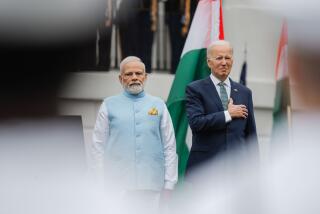End the Nuclear Double Standard for India
- Share via
India and Pakistan are both nuclear powers. But Pakistan has exported uranium enrichment technology to North Korea in exchange for missiles, while India has refused to sell nuclear weapons know-how to any other state. Despite India’s consistent record of honoring international nonproliferation norms, the United States clings to an increasingly obsolete policy that bans U.S. civilian nuclear cooperation with New Delhi. At the same time, Washington permits such cooperation with China, even though Beijing has transferred nuclear and missile technology to Pakistan and Iran.
The ban is a relic of past decades when the United States was pressing India not to become a nuclear power. Now that New Delhi has joined the nuclear club, Washington needs to reshape its policies.
Strategically, U.S. policy is now based on the implicit premise that Asia is more stable with India having a minimum nuclear deterrent than with China enjoying a nuclear monopoly. It no longer makes sense to refuse U.S. cooperation in making Indian civilian nuclear reactors safer and to bar U.S. companies from selling civilian reactors to India, as they do to China.
With 14 operating civilian nuclear reactors that produce electricity, and more on the way, India is anxious to avoid a nuclear disaster like the one at Chernobyl in Ukraine and has periodically asked the U.S. to help ensure the safety of its nuclear installations. Washington has invariably said no, citing U.S. legislative restrictions that resulted from India’s failure to sign the Nuclear Nonproliferation Treaty, or NPT, in 1968.
Last month, however, the Bush administration opened the door slightly to a possible policy reappraisal. The chairman of the U.S. Nuclear Regulatory Commission, Richard Meserve, will meet in January with Indian Atomic Energy Commission Chairman Anil Kakodkar. The White House approved the visit to India after a bitter interagency struggle in which NPT “strict constructionists” tried to block the trip. A compromise was finally reached permitting Meserve to have a “dialogue” but not to arrange actual transfers of nuclear safety technology.
The U.S. rationale for discriminating in favor of China at the expense of India on this issue is based on legalistic hairsplitting. Because China had tested nuclear weapons in 1964, it was classified as a “nuclear weapons state” under the treaty and eligible to sign the NPT, along with the other powers then possessing nuclear weapons. Other states were barred in perpetuity from the nuclear club and asked to forswear nuclear weapons formally by signing the treaty. India branded the NPT as discriminatory and refused to sign. Now it wants to sign as a nuclear weapons state, but the U.S. will not agree.
The NPT does not bar its signatories from providing nuclear technology to nonsignatories such as India. However, the U.S. Congress went beyond the treaty with a law barring nonsignatories from receiving U.S. nuclear technology even if they accepted International Atomic Energy Agency safeguards on its use. This legislation specifically bars the U.S. from helping India to make its reactors safer.
In return for access to U.S. civilian nuclear technology, the U.S. should impose two conditions, at minimum, on India. First, New Delhi would have to accept the international agency’s safeguards not only on any new reactors purchased but also on all its existing civilian nuclear reactors, as it says it is ready to do. Second, India would have to make some form of binding commitment not to export nuclear technology, formalizing its de facto policy.
Significantly, Hans Blix, the former International Atomic Energy Agency director now heading the U.N. inspection team in Iraq, two years ago endorsed the idea of liberalizing civilian nuclear sales to both India and Pakistan -- but with a third, tougher condition. Both would have to freeze their stockpiles of fissile material under intrusive agency safeguards that would block diversion of reactors from civilian to military use.
“There is nothing in the NPT that would stand in the way of such an arrangement,” Blix told a Stockholm seminar. When Blix made this suggestion, Pakistan’s secret nuclear transfers to North Korea had not been exposed. It’s unlikely he would advocate civilian nuclear sales to Islamabad now. But his proposal is more relevant than ever in the case of India. The administration should follow up the Meserve visit with a cooperative nuclear safety program as the prelude to a broader dialogue designed to strengthen India’s demonstrated commitment to nonproliferation.
More to Read
Sign up for Essential California
The most important California stories and recommendations in your inbox every morning.
You may occasionally receive promotional content from the Los Angeles Times.










